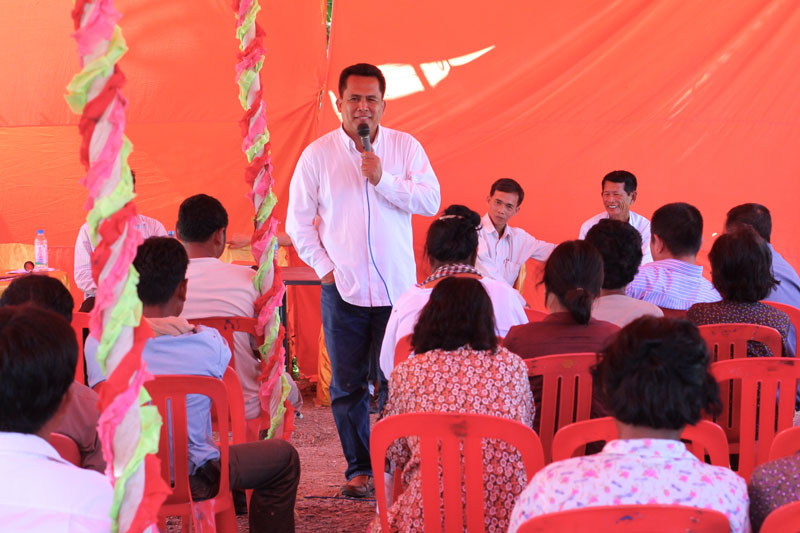SAMRAONG TONG DISTRICT, Kompong Speu province – It’s supposedly not a budding new political party, but Kem Ley’s “Khmer for Khmer” network has all the trappings and rhetoric of a group building a base for an electoral run.
A motley crew of young activists, NGO workers and union officials led by Mr. Ley, a political commentator whose star has risen in tandem with the drama following last year’s election, the controversial “network” has been on the road for the past two weeks visiting disgruntled voters in the country’s provinces.

The aim, Mr. Ley says, is to help supporters of both the ruling and opposition parties push their leaders toward more open and democratic methods of governing. Its main message, however, is one of growing discontent with a neutered parliamentary opposition.
“Politics is the art of reaching a goal,” Mr. Ley told about 100 opposition CNRP supporters here in rural Kompong Speu on Thursday, a group drawn together by their dissatisfaction with the party’s lack of public activity since it joined the assembly in August.
“When they become lawmakers, they reach their goal. There is no other big thing except becoming lawmakers. What else would they do once they become a lawmaker?” Mr. Ley said.
The stop in Kompong Speu, in a village about 20 minutes’ drive from National Road 4 along a ruined dirt road, is the tenth for Mr. Ley’s network since it launched in Sihanoukville on October 19, with the group having also led small public forums in different parts of Ratanakkiri and Battambang provinces.
The network, which includes prominent civil society leaders, insists it only travels to communities that invite it, and aims only to improve existing political parties.
“Our side thinks that we should have a social network that is big and strong to put pressure on the politicians,” said Sam Inn, director of the Life With Dignity NGO, at Thursday’s forum.
“We must have a system that keeps track of them, meaning we let them know they must walk according to the principle and targets we set,” he said. “We can say loudly that we will not give them our votes if they don’t walk this way.”
Mr. Ley spent a large portion of his speech dedicated to talk of improving intra-party governance, with a call for both parties to open themselves up to internal democracy.
“Both the CPP and CNRP have party chiefs right? Who selected the party chief in this commune?” he asked the crowd, before answering. “The party leaders were the ones who chose.”
“When a party chief stands as the candidate for commune chief, he is selected. Who nominates them as the candidate?” he continued, building to a crescendo. “That is the party leaders! And so, he will listen to the party leaders and not to you.”
“Is there any political party that allows the people to select its candidates? Does the CNRP allow the people to nominate a party chief in the commune?” Mr. Ley asked.
“Not at all,” the crowd responded in unison.
Mr. Ley also scored political points that would harden those who believe CNRP deputy public affairs chief Kem Monovithya’s repeated assertion that the intellectual’s network is the first step in his ambitions to form a new political party. Ms. Monovithya is the elder daughter of CNRP and National Assembly Vice President Kem Sokha.
“Kem Sokha, as the vice president of the National Assembly, has a salary of $15,000 a month,” Mr. Ley told the forum during his speech, a claim that Mr. Sokha’s cabinet chief Muth Chantha denied by phone after the event.
“That is completely wrong,” Mr. Chantha said, declining to reveal Mr. Sokha’s actual salary. “Kem Sokha gets paid the same salary as any other lawmaker.”
If Ms. Monovithya’s claim that Mr. Ley secretly plans to refigure his group as a party for the 2017 commune elections is true, it would not be the first time a politician has used a reform group as a platform to establish a new opposition party.
Mr. Sokha himself built his profile from 2002 as founding director of the Cambodian Center for Human Rights before launching his Human Rights Party in 2007. In 2012, the party merged with the larger Sam Rainsy Party to form the CNRP.
Mr. Ley maintains that he has no such intention.
“We want to strengthen democracy inside the two parties,” he said. “That is our goal, not to divide the CNRP.”